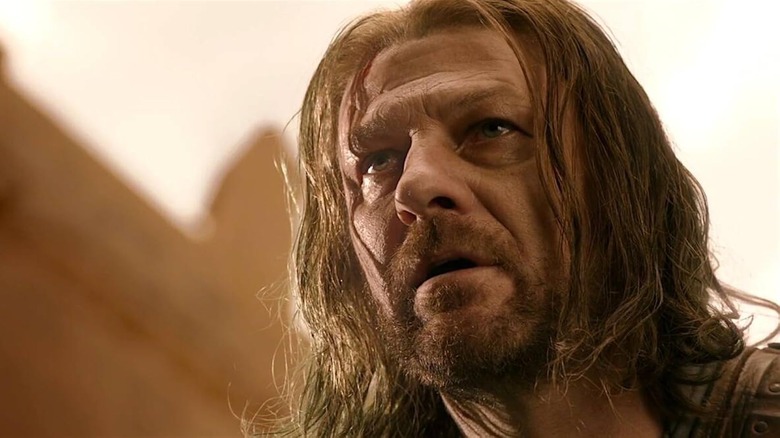A Star Trek Producer Passed On Game Of Thrones Creator George R.R. Martin As A Writer
In the world of George R. R. Martin's "A Song of Ice and Fire" books, one colloquialism is that "words are wind." This is the Westeros equivalent of "actions speak louder." Martin has proven the emptiness of promises correct by having failed to deliver the sixth book, fittingly titled "The Winds Of Winter."
With no new story to discuss, one pastime in "ASOIAF" fan circles is debating why Martin is taking so long, and if he even intends to finish at all. One theory, which notes the hiatus coincided with the premiere of television adaptation "Game of Thrones," is that Martin lost interest in telling the story as prose. Remember, he spent the '80s and '90s as a TV writer after his third novel, "The Armageddon Rag," flopped. He pivoted back to novels with "A Song of Ice and Fire" because his screenplays weren't being made. With "Game of Thrones" and "House of the Dragon," he's achieved recognition in the field he wanted to — which may be one reason he's been vocal about "House of the Dragon" season 2 not going how he'd hoped.
During Martin's time writing for television, he worked on "The Hitchhiker," the 1980s revival of "The Twilight Zone," and "Beauty and the Beast" starring Linda Hamilton and Ron Perlman. He also wrote an episode of the 1995 "Outer Limits" based on his short story "Sandkings" and interviewed for a staff writer job on "Star Trek: The Next Generation." However, a producer turned him down for the latter, and we're all poorer for it.
Speaking at the UCSD's Arthur C. Clarke Center for Human Imagination in 2017, Martin recounted the story of his failed "TNG" job interview:
"I remember coming into the office of this producer –- who thankfully did not last long on the show and you can see why when I tell the story, said 'I don't know who you are, can you tell me your credentials?' And I said 'I am just coming off 'Twilight Zone' where I worked for a while, but before that I wrote novels and short stories. I am primarily a science fiction writer.' And he said 'Oh really, well 'Star Trek' is not a science-fiction show, it is a people show.'"
"I was fooled by the photon torpedoes and starships," Martin joked. "Needless to say, I did not get that job."
George R. R. Martin's watch on Star Trek ended before it began
Martin didn't say who the producer was, but some Trekkies have suggested it might've been the late Maurice Hurley. Whatever the case, he made a mistake. "Star Trek" may explore big ideas and human issues, but it is still a science-fiction show; genre and meaning are not mutually exclusive. It's even more galling because Martin is all about adding human drama to fantastical settings.
He's cited William Faulkner's statement that, "The only thing worth writing about is the human heart in conflict with itself." In a 1991 interview, Martin said: "Any literature is written for the contemporary audience. It may be about the Roman Empire, it may about the old West, it may be about the far future, it may be about a world that never existed, but it's meant for the audience here and now and it's only to the extent that it speaks to that contemporary audience that it is successful or that it is a failure." That sounds right in line with the ethos of "Star Trek" to me.
The proof is in the pudding here (or rather, the epic song that Martin has sung across 3000+ pages). "A Game of Thrones" begins by showing what happens after the typical fantasy epic. Robert Baratheon led a merry band of rebels, slayed the dragon (one named Rhaegar), and overthrew the dark lord. 15 years later, he's a disinterested king, bored after decades of hedonism, and willfully ignorant of the court of vipers surrounding him.
Or take the books' earliest (human) villains, the Lannister twins. Jaime Lannister has the visage of a handsome golden knight but with a cruel heart — until "A Storm of Swords" lets you in his head and you learn the cruelty is just one layer of that heart. Cersei Lannister checks off every box of a wicked queen, but "A Feast of Crows" is about how such a figure would be a paranoid and vindictive tyrant, not an icy puppet master with loyal minions at her beck and call.
Maybe "Star Trek" can finally recompense 40 years later and get Martin to write a "Strange New Worlds" episode or two. It's not as though "The Winds of Winter" will be blowing in anytime soon.

